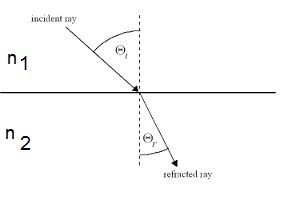As a wave enters a different medium with no change in velocity what will happen to the wave?
1 Answer
I am not sure you can have this situation also because a change in wave velocity is what normally characterize the difference between media!
Explanation:
For the sake of argument let us suppose you have two media, 1 and 2, in which the velocity of the wave is the same.
This implies that the refractive index
(same velocity
Now we can use a fundamental law called Snell's Law relating the angle of incidence with the angle of refraction:

but we considered
so:
meaning that the two angles must be equal or that the angle of incidence is equal to the angle of refraction.
In conclusion, we can deduce that in our (I think) fictious situation (of two different media in which a wave has the same velocity) in passing from one to the other medium the wave is not going to change direction but will continue undeflected.

